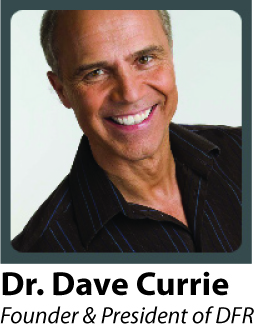Parenting: Helping Kids Handle Peer Pressure
- October 6, 2015

A Candid Q & A with Dr. Dave & Donalyn Currie
“My son is entering Junior High this fall. How can I prepare him to withstand the negative influences that often come from peer pressure?”
Dave: First off, let’s get on the same page. Negative peer pressure is referring to the unhealthy influence that other teens bring upon your child by guiding, encouraging or even forcing your child into actions, attitudes or activities that are certainly not right or the best for them.
Donalyn: To get specific, we’re talking about things like drinking, drugs, vandalism, porn, having sex and unhealthy relationships.
Dave: It also includes pressuring or normalizing disrespectful attitudes, swearing, smoking, dirty talk, tattoos, slacking in school, marijuana use, bullying, sexual experimentation, and searching questionable websites on topics like suicide, building bombs, cutting and more.
Donalyn: Hang on, parents! Even beyond the classroom and the schoolyard settings, parents today have to be aware of the peer pressure in the social network online. There is a lot of negative influence and interaction that goes unmonitored through Instagram, Snapchat, Facebook and the latest of the same.
Dave: In a discussion with a High School Vice-Principal about social media guidelines for their setting, he said that 80% of the disciplinary issues in the school were from the online world after school hours.
Donalyn: It’s a really tough world to bring up kids in. Frankly, I’m glad ours are grown.
Dave: The truth is, a lot of your work should have been done before their first day of middle school. Not to guilt any parent but it comes down to how well you have built a sense of personal worth into your young teen. If a child’s self-esteem is strong, they will have enough ego-strength to be able to stand-alone and even walk away if needed. On the other hand, if the young teen is filled with insecurities, they may make a lot of poor choices by bending to negative peer pressure.
Donalyn: That’s right, Dave. We can’t stress this enough. You need to tell your son over and over again that you love him and you believe in him. He will know you want his best. It is wise to communicate clearly and consistently that they belong and your love isn’t conditional. Our line was, “there’s nothing you will ever do that will make us quit loving you”.
Dave: Love and security are at the heart of transforming a person. You see, the teenager is in transition. He is becoming an adult. He needs far fewer critics and a lot more supporters. Through the stability and the consistency of your encouragement and affirmation, they grow to become a confident person, knowing that Mom and Dad really believe in him.
Donalyn: Many parents are so busy and worried about teaching their kids to do the right things that they forget about teaching them to become the right person. While we need to coach in character and values, they desperately need to know that we believe in and value them as a person.
Dave: It starts early with establishing an open and engaging relationship with your child and then building on that through the teen years. It’s important to continue to find ways to stay connected with each child like shooting hoops, listening to their music, supporting their drama and more to deepen the relationship through adolescence.
Donalyn: But keep it simple too. Be sure you are just there to let him talk things out with you. Take time to listen on a regular basis: not to judge, not to give advice, but to just listen.
Dave: To find ways to keep building a relationship is so needed. Sometimes we think as parents that the older the young person gets, the less time we need to spend with them. We think, “they can take care of themselves, they have their own friends and interests, and I should let them grow up, right?” But wisdom is it’s not less time with your young teen, it’s just different time. You need to support them in their activities, encourage them, be their greatest fan, and continue to take time to find common ground with them – neutral to positive activities—that they like to do and are willing to do with you.
Donalyn: Speaking of transition into adulthood, we’ve always felt that it’s important to encourage our teens to get and stay involved in many kinds of healthy activities – sports, drama, music, youth group—even multiple sports at a time isn’t that bad. Young teens have limitless energy. Even though it is costly with your time and your resources, it is much better to have them active with something profitable than having a lot of free time where they can get caught up in the wrong kinds of activities through peer pressure.
Dave: So true, Donalyn. Based on watching our own four graduate from high school, and also observing the interaction and issues of 100’s of families, it’s far better for them to be constructively busy than just sitting around. We witnessed some of our teens’ peers that got into a lot of trouble because their parents got lazy in making provision for them to get into activities or were hesitant to pay for them to be involved. Keep them busy.
Donalyn: I want to shift back again to discussing things with your teen. It is important to find the time of the day that he is most willing to talk and for you to be available at that time. For some it’s right after school; for some it’s at breakfast, for some it’s at bedtime, and for others it’s even while you’re driving – when you’re kind of preoccupied on the road—it’s here that great discussions start. I’ll give you my secret. I used after school time for “unplanned” discussions, as I would have fresh baking available 2 or 3 nights a week. It worked.
Dave: Well, that worked well. Parents should talk openly about the real issues too. Don’t hesitate to bring up topics that you know that all teenagers face. We made a commitment to have the complete sex talk between Dad and son, and between Mom and daughter, by age 11. With accessibility to online information, it should be by age 9 now. Our discussion was full and complete in every way. It may be uncomfortable, but you want your preteen to hear the truth on these issues from your perspective first before it gets challenged by the world’s and other’s opinions.
Donalyn: Ask questions about how they’re going to make decisions concerning drinking, drugs and relationships and the other topics of the day. Ask what they think are the pros and cons of these activities. They usually do know the right answers and it’s easier for them to say what they feel to be true than simply get your answers or feel like they’re getting preached at. And as they face the different pressures in junior high, help them to understand that the earlier they take their stand for what they know to be right, the easier it will be to maintain that stand.
Dave: But the longer they wait to take a stand, the harder it’s going to be to stand up for what they know is right. As they spread their wings and gain more freedoms it’s important for you to work yourself into a position of guiding them, because you do have less control. Don’t just give them a list of do’s and don’ts, but teach them how to make reasoned, informed decisions for themselves and for their future—decisions that honour God.
Donalyn: And don’t drop the parent’s trump card and say, “Just because.” They older they get, start giving valid reasons for your concerns. Talk openly, but share your perspective as something for them to consider, not as ultimatums. You’re coaching them in how to think, not just what to think. A wise parent takes time to understand the teen’s world. Doing some reading on parenting teens wouldn’t hurt. Things are very different from when you grew up. Ask them to explain what it is like at school now. Learn about their world, the new phrases, activities, bands and all. Talk with them, listen and understand.
Dave: The selection of friends is another big issue. Be cautious about saying no to their choice of friends because they’ll end up defending them and want to hang out with them away from you anyway. We found it better over the long haul to welcome, accept and love their friends, and to let them make the decisions about their friends in the context of our acceptance, rather than our criticism. If you accept and love their friends, not only will you have a chance to influence and encourage those friends and see who your kids are hanging around with, you will also let your kids make their decisions about friendship without any pressures from you. They will learn to discern who is best to hang around with in most situations.
Donalyn: For this reason, make your house a place that he wants to bring his friends home to. Be willing to drive him and his friends around. Make it fun, not a chore. Accept this as part of your role as a caring parent.
Dave: I would go one step further. Make your house the “party” house… with you there that is. Tell them that your home is open to have their friends over. Whether it’s sleepovers or actual parties, be there to encourage, welcome, and befriend. Be willing to buy the pizza – it will cost you more in the long run not to do this, so pay the price, buy a few pizzas, and accept that being a safe place for your teen and his friends to hang out is a good thing. You’ll learn a lot about your teenager by doing this.
Donalyn: We’ve learned a lot over the years in working with our four as they went through the teen years. It comes right down to these two things: You need to live an example of what you want your teens to become, and you need to love them unconditionally. They will hear your advice if you live your advice.
Dave: And not only tell them that you’re praying for them, but actually pray with them and for them. Not with a sense of guilt or pressuring them because God is watching and is going to get them, but that God loves them and has a plan for their life. He’s a God of forgiveness, and He’s forgiven you as parents many times.
Donalyn: Be sure to pass on to your teens that God is a loving God who is gracious and accepts us despite our mistakes. It’s a great concept for all of us to remember, actually. His grace is sufficient in our weakness.
Dave: Finally, remember that helping your kids faced the peer pressure through the teen years should not be feared. It was a good time with all four of our kids, and looking back, I would take those teen years again in a heartbeat. It was a great time of life. Do a good job in the preteen years, and junior high and high school will be a fabulous time. Oh yes, and don’t forget to ask God for lots of wisdom day to day.
© Dr. Dave Currie – September 2015

Feature image used with permission: © fotolia.com/image #57558277/WavebreakMediaMicro.
